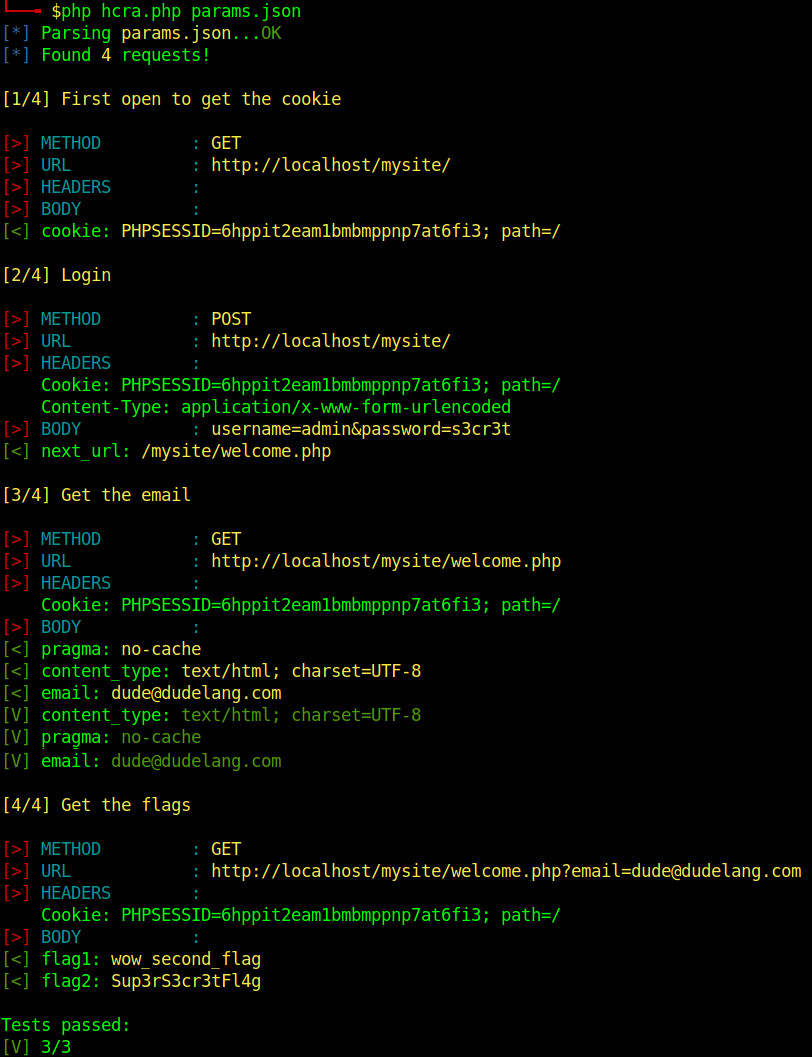171 lines
5.0 KiB
Markdown
171 lines
5.0 KiB
Markdown
# HTTP Chained Requests Automator
|
|
This PHP script automates and chains HTTP requests, extracting values from headers or body and use them for the next requests. Very useful for penetration tests.
|
|
|
|

|
|
|
|
It has been ispired by a business-logic challenge of Port Swigger:
|
|
|
|
https://portswigger.net/web-security/logic-flaws/examples/lab-logic-flaws-infinite-money
|
|
|
|
## Installation
|
|
|
|
First download and install **composer** from here:
|
|
|
|
https://getcomposer.org/download/
|
|
|
|
Then:
|
|
|
|
```bash
|
|
$ php composer.phar install
|
|
```
|
|
|
|
## Usage
|
|
|
|
```bash
|
|
$ php hcra.php params.json
|
|
```
|
|
|
|
- params.json: is the filename of the JSON file with specifications of the HTTP requests
|
|
|
|
## Configuration
|
|
|
|
To configure HTTP request you have to code your custom JSON file. You can start from the example in the repository:
|
|
|
|
```json
|
|
{
|
|
"configuration":
|
|
{
|
|
"verbose_level": 1
|
|
}
|
|
,
|
|
"urls": [
|
|
{
|
|
"title": "First open to get the cookie",
|
|
"url": "http://localhost/mysite/",
|
|
"method": "GET",
|
|
"headers": null,
|
|
"body": null,
|
|
"header-regexp": [
|
|
{
|
|
"cookie": "/Set-Cookie: (.+?)$/"
|
|
}
|
|
],
|
|
"body-regexp": null
|
|
},
|
|
{
|
|
"title": "Login",
|
|
"url": "http://localhost/mysite/",
|
|
"method": "POST",
|
|
"headers": {
|
|
"Cookie": "§cookie§",
|
|
"Content-Type": "application/x-www-form-urlencoded"
|
|
},
|
|
"body": "username=admin&password=s3cr3t",
|
|
"header-regexp": [
|
|
{
|
|
"next_url": "/Location: (.+)/"
|
|
}
|
|
],
|
|
"body-regexp": null,
|
|
"extra_guzzle_options": [
|
|
{
|
|
"allow_redirects": false
|
|
}
|
|
]
|
|
},
|
|
{
|
|
"title": "Get the email",
|
|
"url": "http://localhost§next_url§",
|
|
"method": "GET",
|
|
"headers": {
|
|
"Cookie": "§cookie§"
|
|
},
|
|
"body": null,
|
|
"header-regexp": [
|
|
{
|
|
"content_type": "/Content-Type: (.+)/",
|
|
"pragma": "/Pragma: (.+)/"
|
|
}
|
|
],
|
|
"body-regexp": [
|
|
{
|
|
"email": "/<p>Your email is (.+)!<\\/p>/"
|
|
}
|
|
],
|
|
"header-expected":
|
|
{
|
|
"content_type": "text/html; charset=UTF-8",
|
|
"pragma": "no-cache"
|
|
},
|
|
"body-expected":
|
|
{
|
|
"email": "dude@dudelang.com"
|
|
}
|
|
},
|
|
{
|
|
"title": "Get the flags",
|
|
"url": "http://localhost§next_url§?email=§email§",
|
|
"method": "GET",
|
|
"headers": {
|
|
"Cookie": "§cookie§"
|
|
},
|
|
"body": null,
|
|
"header-regexp": [
|
|
{
|
|
"flag1": "/Set-Cookie: flag2=(.+?);/"
|
|
}
|
|
],
|
|
"body-regexp": [
|
|
{
|
|
"flag2": "/<p>Congratulations, the flag is: (.+?)<\\/p>/"
|
|
}
|
|
]
|
|
}
|
|
]
|
|
}
|
|
```
|
|
|
|
Every JSON object is an HTTP request with specific parameters:
|
|
- **configuration -> verbose_level**: the verbosity of the output. It accepts values from 1 to 3
|
|
- **title**: the title of the to request
|
|
- **url**: the URL to request
|
|
- **method**: GET|POST (you could also use PUT, DELETE, etc, but not yet tested!)
|
|
- **headers**: a JSON array with all headers you want to send with the request
|
|
- **body**: the body of the request in case you send a POST request
|
|
- **header-regexp**: an array of regular expressions you want to use to extract values from the headers. IMPORTANT: only the first value per regexp will be matched
|
|
- **body-regexp**: like header-regexp, but the values will be matched against the response body
|
|
- **header-expected**: an array of key/value to look for in the response headers (useful for test purpose)
|
|
- **body-expected**: an array of key/value to look for in the body headers (useful for test purpose)
|
|
- **extra_guzzle_options**: array of extra Guzzle options. Here you can find a full list of options: https://docs.guzzlephp.org/en/stable/request-options.html
|
|
|
|
Example:
|
|
|
|
```php
|
|
"next_url": "/Location: (.+?)$/"
|
|
```
|
|
|
|
This will match the redirection after the first request, for example:
|
|
```http
|
|
Location: /mysite/welcome
|
|
```
|
|
|
|
If match happens, you can use
|
|
```php
|
|
§next_url§
|
|
```
|
|
|
|
as a variable on the next requests, so the 2nd url will change from:
|
|
```json
|
|
"url": "http://localhost§next_url§",
|
|
```
|
|
to:
|
|
```json
|
|
"url": "http://localhost/mysite/welcome",
|
|
```
|
|
|
|
until you match another **next_url** values with another regular expression with the next requests.
|
|
|
|
## TODO
|
|
- better error handling
|
|
- add some logics, so for example the script can restart from a specific request after getting some specific results from the variables
|